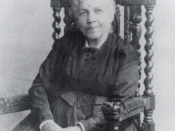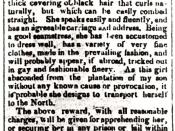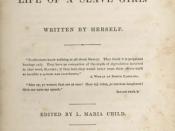Solid essay about biographical determinism in former slave/writer
Biography and History -- Harriet Jacob's The Life of a Slave Girl
To be a good writer, you must posess a careful balance between detachment and
association, a delicate waltz where you are not so wrapped up in the events of a story that it
alienates the reader, and yet not so far separated from the subject matter that the readers cannot
get into it. This is espectially the case in an autobiographical narrative. In this case, it is very
difficult to detach yourself from the main subject matter, that is, yourself. Yet it must remain a
story, and the story at its heart is a reconstruction of facts from the memory of the author. In the
case of Harriet Jacobs, it was also important that she make sure the readers understood slavery
from a woman's perspective. The hardships she had to endure not only entailed the work and the
punishments, but also the sexual aspect of being a slave-girl.
Her task is difficult, because in
order for the reader to really understand her position as a woman and a slave, she must make the
story extremely personal. If it is too personal, however, the reader looses sight of the bigger
picture, and does not relate all these hardships to the condition of the general female slave. She
accomplishes this in two ways, through her writing style, and the writing content.
The style that the novel is written varies from a dialogue to a narrative, depending on the
subject matter being written about. For example, the dialogue where Mrs. Flint confronts Linda
(Jocobs) and asks her what has been going on with her husband is handled very effectively,
because as a conversation between two people, we are able to pick up...


